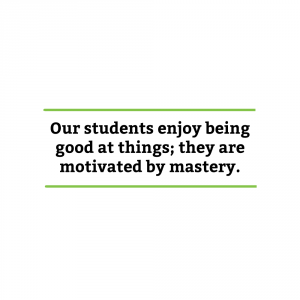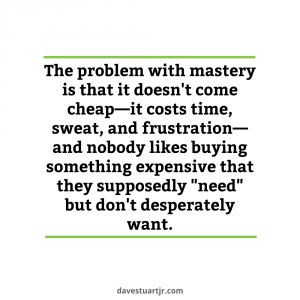Students want to be good at things because it is fun being good at things. In other words, they are motivated by being good at, or mastering, things.
Daniel Pink's Drive, perhaps the most influential book on motivation of the past decade, is the most famous affirmation of this truth. Pink boils motivation down to three elements: autonomy, mastery, and purpose (or AMP). That middle one — mastery — is what I'm talking about.
 So write this down for yourself somewhere if it's not already a part of the way you think about students: our students enjoy being good at things; they are motivated by mastery. (You're the same way, it turns out. This is why, if you're an early career teacher especially, you need to focus on improving, not on perfection. Once you're a few years into an aggressive “I'm going to get better today” mindset, this job starts being more motivating because you start being pretty good at it. But teachers grow at drastically different rates, in part because some never leave their perfectionistic mindsets — thereby retarding their growth — and some abandon it right away.)
So write this down for yourself somewhere if it's not already a part of the way you think about students: our students enjoy being good at things; they are motivated by mastery. (You're the same way, it turns out. This is why, if you're an early career teacher especially, you need to focus on improving, not on perfection. Once you're a few years into an aggressive “I'm going to get better today” mindset, this job starts being more motivating because you start being pretty good at it. But teachers grow at drastically different rates, in part because some never leave their perfectionistic mindsets — thereby retarding their growth — and some abandon it right away.)
Mastering things is fun. It is fun knowing Spanish, being good at basketball, owning grammar, dominating calculus, and making art people admire. I can see evidence of this on my students' faces when they recall something from a few lessons ago or finally get the hang of pop-up debate. I see it when my five-year-old smiles at her improving handwriting.
Now let's get to the ‘but.'
The problem with mastery
If being good at things is motivating, why aren't kids eagerly rushing into my class and hanging on my every word of instruction as I teach them writing or problem-solving or arguing or complex text reading?
I think this is one of the most interesting questions in education today, or maybe ever. Let's just sit for a moment and marinate in the blessing of working in a field where we get to pursue such interesting questions.
Really. Forget the demotivating policies and evaluation schemes and just think on the interesting parts about the work.
Mmm.
 Back to it: why aren't kids eager for the mastery we offer? I have a lot of hypotheses, as I'm sure you do, but here's one for today's article: The problem with mastery is that it doesn't come cheap — it costs time, sweat, and frustration — and nobody likes buying something expensive that they supposedly “need” but don't desperately want. My car may need a transmission, but that doesn't mean I'm pumped about paying for it.
Back to it: why aren't kids eager for the mastery we offer? I have a lot of hypotheses, as I'm sure you do, but here's one for today's article: The problem with mastery is that it doesn't come cheap — it costs time, sweat, and frustration — and nobody likes buying something expensive that they supposedly “need” but don't desperately want. My car may need a transmission, but that doesn't mean I'm pumped about paying for it.
Mastery's expense is why more of our kids aren't begging us to let them work on the difficult skills and subjects we teach. If there were a magic You Now Know All of World History pill, all of my students would take it. The problem with my students' motivation isn't that they're against gaining historical knowledge and skill; it's that many of them don't see that the mastery is worth the effort.
Which brings us to video games.
Why difficult video games are so addicting
Today's video games are hard — and if you don't believe me, ask some of your students to bring an Xbox into school one day so they can show you; or just ask them one of their favorite games and search on Youtube for a video of someone recording themselves playing that game. (Yes, that is a thing. A very popular thing, it turns out.)
Or just trust me that today's video games are hard.
Yet, so many of my kids gleefully spend hours mastering the latest video game when they could be, oh, I don't know, doing the article of the week, maybe. And this despite my clearly logical arguments that the skills gained in the consistent completion of articles of the week will be much more helpful in one's future than those gained in the consistent completion of Halo 7 multiplayer matches.
Why do kids pay the time/effort/frustration cost for video game mastery, then? Two reasons: 1) video games today are unmatched in their ability to guide players through the costly process of gaining mastery, and 2) they provide great incentives for being awesome at them. The new player begins with a tutorial, advances through intermediate stages of play, and receives rewards (levels, achievements, access to new parts of the game's story) all along the way. Upon reaching mastery, awesome things start happening: your team wins the World Cup, or you save the galaxy, or you learn some wicked move that annihilates an opponent, or whatever. By day, you're this regular person going to school, doing your time, and by night you are this superhuman athlete or mage warlock or futuristic warrior.
What's the connection between video games and our classrooms?

Plenty of folks are trying to “gamify” education right now. No offense, but my gut is that gamifying my classroom isn't The Answer to student motivation or, more importantly, the promotion of long-term student flourishing. Here's why: I can't foresee a world where All The Things are gamified for us.
Marriage, work, civic engagement, parenting — these are things that will probably just keep being the hardest, most worthwhile, most impactful things we do as humans. They will likely persist in requiring us to meet them on their terms, rather than them meeting us on ours. And so I don't see gamifying my world history class as a viable path for helping my students motivate themselves; rather, I think I need to show them that there is a way to live one's life kind of like a video game.
That is what “Do Hard Things” is about (see Fig. 1): setting worthwhile challenges for yourself and experimenting with realizing those challenges. When we adopt a “Do Hard Things” attitude, we step out of life's bleachers, walk into the arena, and find a throughline of adventure running through the stories we're creating.
Next week, I'll elaborate on how we become, for the sake of our loved ones and our students, the kind of people who Do Hard Things and enjoy life more in the process. (Click here to read that.)[hr]
Thanks to Alex and Brett Harris for their book Do Hard Things, which influenced me greatly during the year preceding the start of this blog.
ML says
Love the Harris brothers! Great post as usual!
davestuartjr says
Thank you ML!
immeasurablematt says
Really awesome article Dave. There is no supplement for diligence and perseverance in any pursuit of mastery, least of all in the pursuit of education. The article you reference on gamification was written by one of the authors who writes for the blog I edit, http://www.blog.tophat.com . I just wanted to mention to readers who may be unfamiliar with our blog that our message is not limited to the views of that single post.
Of course, gamification is not “The Answer” to all that ails teaching and learning today. Which is why our blog provides helpful, practical advice for modern educators across a range of relevant issues including: active learning, blended learning, the value of humor in the classroom, the power of empathy, how to devalue cheating, alternative assessment strategies and way more.
Thanks for linking to us and making me aware of your blog, I’m always looking for useful, spirited content relevant to modern educators to share across our social media channels. You’ve been bookmarked!
peace!
-Matthew
davestuartjr says
Matt, this is an awesome comment and I’m so glad you wrote it, because indeed, your site is awesome and you write about topics from an angle I resonate with: a desire to get to the bottom of things, to help teachers, to improve student learning. In short, you are far from the voices who purport to hold The Answers to all that ail us in classrooms around the world. This is deep, complex work — thank you for working hard within it! It’s always a privilege meeting a fellow edu-thinker!
Sarah Supahan says
Hi Dave, I ran across this article again and had to re-read it in my current context. I get your emails, but usually read and delete them (fighting a memory issue on my computer). Reading it here I’m not sure what date it was written and I don’t know how to find the next week’s blog after this one – which I now want to re-read as well! Can you direct me?
davestuartjr says
Hi Sarah! Thank you for this comment — you’re looking for this post.